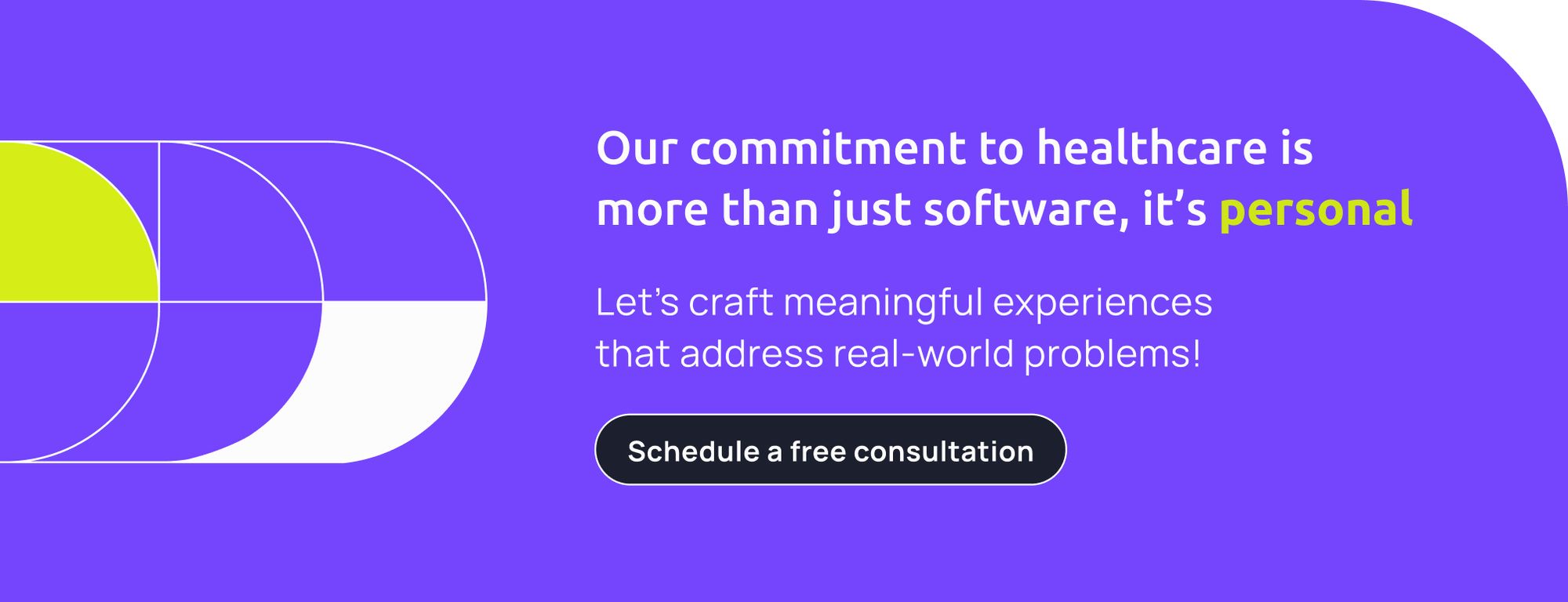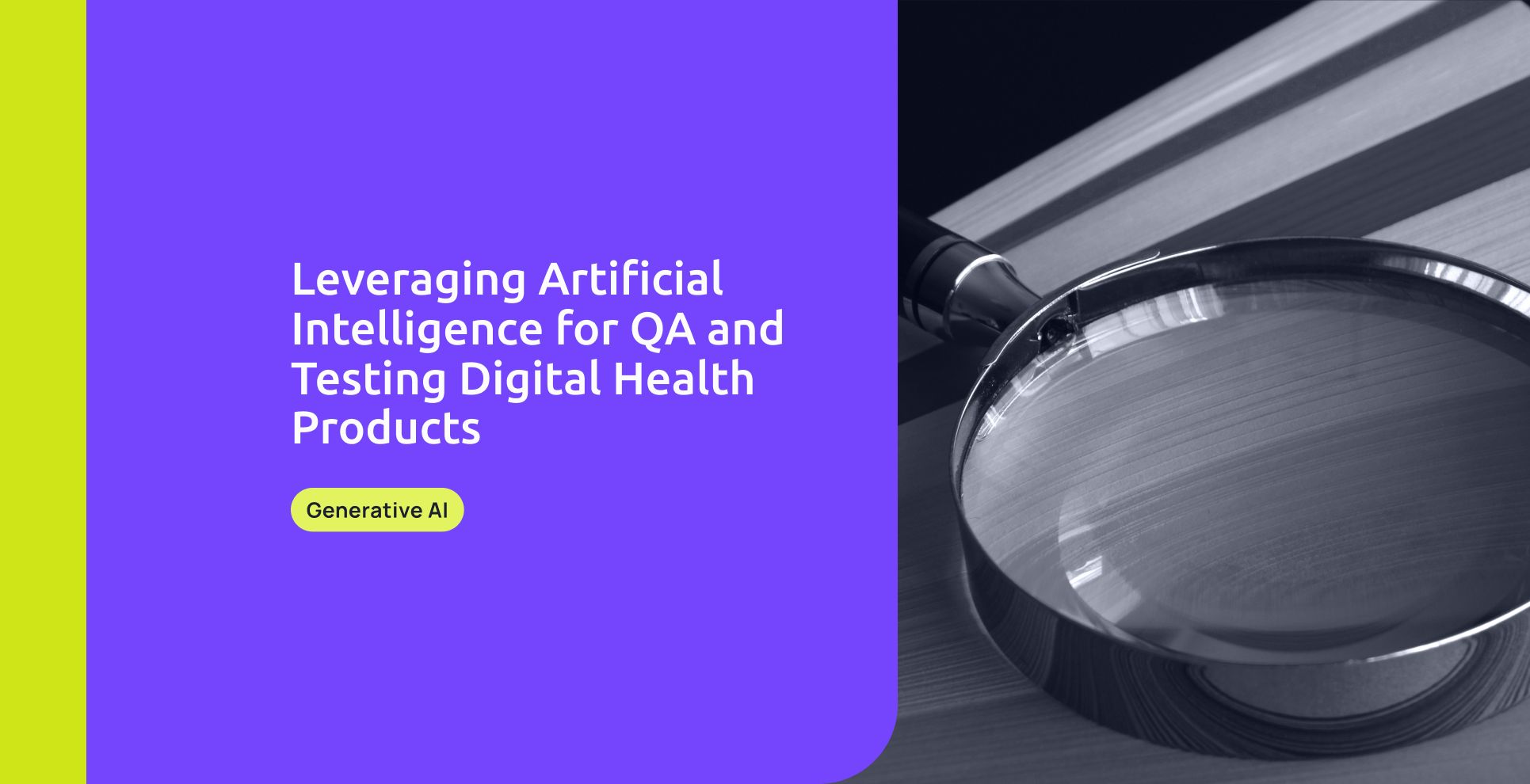In the rapidly and ferociously evolving landscape of digital health and health tech, ensuring the quality and reliability of products is critical. QA and testing specialists face numerous challenges in this domain, from data management and HIPAA compliance to interoperability and complex integrations. However, with the beginning of generative artificial intelligence (aka Gen AI), teams can execute the testing and QA process more effectively and efficiently.
In this blog post, we will explore the role of generative AI in the Quality Assurance and Testing of digital health products, addressing the challenges faced by professionals and offering strategies to overcome them.
Navigating the QA Challenges
Several challenges arise when testing digital health products:
- Platform compatibility
- OS compatibility
- Interoperability
- Connectivity
- Synchronization
- Data management and integrity
- Access control
- Biometric measurements
- Stable and secure audio/video transmission
- Privacy concerns
- Regulatory compliance.
Leveraging Gen AI, teams can overcome these challenges.
Data Management and HIPAA Compliance
Creating synthetic datasets that retain statistical characteristics can be made by Generative AI while ensuring HIPAA compliance.
Properly managing protected healthcare information (PHI) and sensitive patient data is essential, so avoid sharing PHI with AI tools. Generative AI should be helpful as well as safe.
Enhancing Testability and Realistic Environments
Generative AI can help create realistic test environments by generating:
- Synthetic patient profiles
- Medical records
- Real-world scenarios.
This practical simulation allows QA Testers to ensure careful evaluation and replicating of several user interactions and system responses.
By leveraging generative AI for QA testing, testers can create diverse and complex scenarios that closely mimic real-world conditions. This capability enhances the accuracy and reliability of software testing, ensuring systems perform optimally under various conditions.
Addressing Interoperability and Integration Challenges with GEN AI
Interoperability and seamless integrations between digital health systems are crucial for effective healthcare product delivery. Generative AI can facilitate simulating the behavior of the systems and interfaces involved in the digital health ecosystem, enabling interoperability testing, boosting integration testing, and helping to identify potential threats and risks.
Ethical Considerations of Generative AI in Healthcare
While generative AI holds massive potential, it is essential to address ethical considerations. AI models' judgment, transparency, and interpretability are crucial to avoid biases and potential patient harm. While using Gen AI tools, QA specialists must implement rigorous testing strategies to identify and mitigate ethical concerns.
1. Test Design and Execution of Digital Health Products
Testing digital health products poses unique challenges that require specialized approaches and considerations.
QA and Testing specialists face diverse complexities depending on the type of digital health product they need to test.
- Mobile Health (mHealth) Apps
- Wearable Devices
- Software as a medical device
- Telehealth
- Remote Patient Monitoring (RMP) systems
- Clinical Decision Support Systems (CDSS)
- Electronic Health Records (EHRs)
- Personalized treatment plans and digital mental health products.
2. Artificial Intelligence for Testing
Using generative AI, teams can create customized scenarios, treatment plans, combinations of data casuistic, and use cases based on accurate real-wise individual patient data. Also, Gen AI can assist in decision-making, ultimately improving patient outcomes and health diagnoses.
3. ChatGPT for Healthcare Products Testing
Using ChatGPT and Generative AI in a HIPAA-Compliant Way is necessary when discussing digital health products. However, be cautious; ensure you don't provide real patient information.

ChatGPT helps testers and QA fellows create impactful test strategies and ideate critical test scenarios.
Take a look at the following example where we prompted ChatGPT to request specific test scenarios:
Source: ChatGPT
Source: ChatGPT
Here's the conversation. Feel free to take it and adapt it to your needs.
Another good use of ChatGPT is to help you design a test and quality strategy. Here is an example of a strategy prompt we made and ChatGPT's outcome.
4. Leveraging ChatGPT for Test Automation
This example shows how we prompted ChatGPT to assist in test automation using JavaScript, Selenium WebDriver, MochaJS, and ChaiJS.
As you can see, the outcome goes from the project setup to the specific test scripts.
That is a good starting point, for sure!
AI-powered Quality Assurance in Digital Health
AI-based Risk Management in Digital Health
By leveraging generative AI, QA professionals can develop predictive models identifying potential risks in digital health products. These models can analyze data patterns and predict possible failures or vulnerabilities, allowing teams to proactively mitigate threats before they impact patient or healthcare provider users.
AI for Regulatory Compliance
Navigating the complex regulatory landscape of Healthcare can be challenging. Generative AI can streamline the "compliance process" by analyzing regulations and automatically generating compliance reports, ensuring that digital health products adhere to the needed and proper guidelines.
Ensuring Data Security and PHI Protection when using AI tools
Data security and proper Protected Health Information (PHI) management are critical in digital health products. Generative AI offers innovative solutions to address these concerns by creating synthetic datasets that retain the statistical characteristics of real patient data without compromising privacy. Testers can conduct detailed testing without exposing patient information, ensuring compliance with privacy regulations like HIPAA (Health Insurance Portability and Accountability) while maintaining the integrity and security of sensitive healthcare data.
Future Trends in Generative AI Healthcare
Generative AI is continuously advancing and opening up new possibilities in Healthcare. For instance, AI models can generate synthetic medical images for training purposes, reducing the reliance on inadequate or expensive real-world data. Additionally, generative AI can assist in drug discovery, simulating the effects of potential compounds to accelerate research and development.

Final thoughts
Digital health products are vital in the Healthcare Revolution, but product teams must test them actively to improve quality and reliability. Generative AI offers significant benefits in addressing QA and testing professionals' challenges. From synthetic datasets and test environments to personalized treatment and risk management, generative AI enables a more effective and efficient QA process.
As the healthcare industry continues to embrace AI, leveraging generative AI in testing digital health products will undoubtedly contribute to improved patient outcomes and a brighter future for healthcare innovation.
Remember, in the ever-changing world of digital health, the pursuit of quality and patient safety should always remain a priority, and generative AI can be an invaluable tool in achieving those goals.
We'll keep talking about this matter, so stay tuned!

